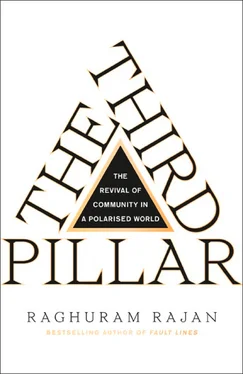The expansion of the suffrage was typically followed, both in the United States and the United Kingdom, by an increase in local public spending: on local schools open to all, on health care and public heath necessities like sewerage systems and public toilets in urban areas, and on local support systems for the indigent and elderly. 25Thus community powers and activity centering on local spending strengthened as the voting franchise broadened.
The expansion of the suffrage was rarely linear. For instance, in the United States, at the same time as economic-based restrictions on voting eligibility were abandoned under the populist president Andrew Jackson, groups that were deemed unsuitable for participation in community decisions, such as blacks, women, Native Americans, the mentally incompetent, criminals, and the newly resident, were explicitly excluded. 26Indeed, on the eve of the Civil War, only the five New England states where blacks were few, and New York, which had a $250 property requirement applied only to blacks, still allowed blacks to vote. When Southern blacks obtained the right to vote after the Civil War, they started being excluded again through a variety of targeted measures such as literacy and residency tests.
Latin America also followed a similar pattern, starting with strict property requirements, followed by an extension of the franchise as pressure on landowners came from other citizens of European descent, and eventually a replacement of economic restrictions with literacy tests so as to specifically exclude workers and the poor, especially Native Americans. By the end of the nineteenth century, suffrage was still far from universal in much of Western Europe and North America, with women and minorities generally excluded (New Zealand was the first modern country to let women vote in 1893). However, there had been a substantial expansion in the electoral franchise to nearly all white men, a significant broadening of the franchise since the minuscule electorates at the beginning of the century. Why did this happen?
WHY WAS THE FRANCHISE EXTENDED?
As markets became more integrated, both nationally and internationally, economic adversity from far away could affect a community, and disproportionately the less well-to-do. In the same way that a free market decentralised economic decision making, a more democratic structure would allow many more voices to be heard, allow the local community to influence their representatives and the federal government, and allow people to feel more in control of their destinies. Political empowerment could compensate, in a small way, for the lack of economic empowerment.
Why did legislators, whose allegiance was to those who already had the vote, extend the franchise? After all, few who have power want to share it. We can dismiss the possibility that the legislators suddenly absorbed the spirit of the Enlightenment, believing that in the interests of fairness, suffrage should become universal, and in the interests of legitimacy, every one among the ruled should have a voice in government. While the rallying cry of the American Revolution was ‘no taxation without representation’, it said nothing about the representation of those who did not pay taxes. In fact, the franchise was typically extended in steps, not in one go (as might have been the case if legislators became suddenly enlightened). Therefore, we have to look elsewhere for explanations.
Fear
Economist Daron Acemoglu and political scientist James Robinson argue that an important reason for the elite to extend the franchise was perhaps the fear that if it were not extended, the unwashed masses might revolt. 27The French Revolution was a warning to those in power that if they were not careful, many of their heads could end up mounted on pikes. And yet the Revolution could also be read as a cautionary tale of what could happen if revolutionaries were given a role in government. The archconservative Edmund Burke warned ‘the occupation of a hair-dresser … cannot be a matter of honour to any person … Such descriptions of men ought not to suffer oppression from the state, but the state suffers oppression if such as they … are permitted to rule. In this you think you are combating prejudice, but you are at war with nature.’ 28This then was the dilemma that tormented the guardians of political power: Should the masses be kept outside the gate, with the hope that the gate would withstand their anger, or should they be let inside with the hope that they would be tamed?
Widespread economic adversity did certainly precipitate violent political agitation for greater inclusion. For instance, after the failure of the harvests of 1829 and 1830 in England, agricultural labourers burned the fields of the gentry under the orders of a mysterious Captain Swing and destroyed threshing machines. 29Some argue that this led to the first voting Reform Act of 1832. Yet the state repressed the agitation fiercely, with over two thousand people arrested, five hundred transported to Australia, six hundred imprisoned, and nineteen executed. Moreover, the Reform Act gave the vote to those with property having a rental equivalent of 10 pounds a year, a sum far outside the reach of the labourer. It was widely alleged that the elite were buying off the middle class. At any rate, the newly enfranchised certainly were not in the crowd with pitchforks.
Конец ознакомительного фрагмента.
Текст предоставлен ООО «ЛитРес».
Прочитайте эту книгу целиком, купив полную легальную версию на ЛитРес.
Безопасно оплатить книгу можно банковской картой Visa, MasterCard, Maestro, со счета мобильного телефона, с платежного терминала, в салоне МТС или Связной, через PayPal, WebMoney, Яндекс.Деньги, QIWI Кошелек, бонусными картами или другим удобным Вам способом.












